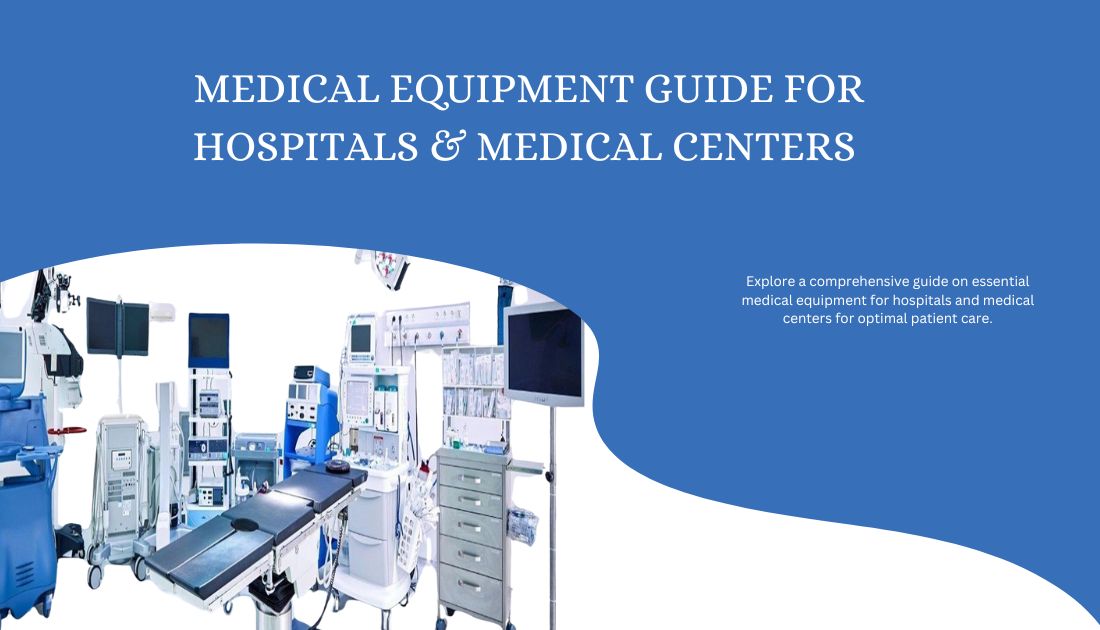Medical equipment guide for hospitals & medical centers

Veteran Affairs Medical Centers (VAMCs) and Hospitals are like big helpers for our veterans, giving them lots of different healthcare services. These places work hard to get and use the right tools and machines to help veterans. This article is all about why these tools and machines are so important in VAMCs. It tells you about the different kinds of tools and why each one is really important.
The Importance of Medical Equipment in VAMCs
Modern and good medical equipment is super important for giving great healthcare in VAMCs. It helps doctors and nurses figure out what’s wrong with patients, give the right treatments, and help them get better. Also, these new machines make patients feel more comfortable, make work easier for everyone, and keep everyone safe.
Primary Care Medical Equipment Checklist
Diagnostic Equipment
- Blood Pressure Monitors: Very important for checking how healthy your heart and blood vessels are.
- Thermometers are necessary for keeping track of your body’s temperature. They help ensure that your body is not too hot or too cold.
- Stethoscopes: Used for listening to your heart and lungs and hearing if they sound healthy.
- Pulse Oximeters: Check how much oxygen is in your blood.
- Otoscopes and Ophthalmoscopes help doctors examine your ears, nose, throat, and eyes to determine your health.
- Sphygmomanometers: Checks how hard your heart is working to pump blood around your body.
- Ultrasound Doppler: Helps doctors check how well your blood vessels are working.
Examination Equipment
- Examination Tables: Gives a strong and steady surface for doctors to check your health.
- Examination Lighting: Make sure doctors can see well enough when they check you.
- Physician Stools: Provides comfy chairs for doctors and nurses to sit on while they help you.
- Height Rods and Weight Scales: Check how tall and heavy someone is with precision.
- Reflex Hammers and Tuning Forks: Check how well your brain and nerves are working.
Point-Of-Care Testing Devices
- Glucose Meters: Keep track of how much sugar is in your blood.
- Haemoglobin Analyzers: Check how much haemoglobin is in your blood by testing a sample.
Minor Procedure Equipment
- Suture Kits: Very important for closing wounds and cuts properly.
- Cryotherapy Equipment: Helps with treatments that freeze a small area of your body.
- Minor Surgical Instruments: Helps with small surgeries or procedures.
Acute Care Medical Equipment Checklist
In places where people need quick medical help, like VAMCs, special equipment is used immediately. This equipment helps take care of urgent medical needs quickly
- Ventilators: Assist patients with respiratory challenges.
- Cardiac Monitors: Monitor heart activity continuously.
- Defibrillators: Provide lifesaving shocks in cardiac emergencies.
- IV Pumps: Administer precise medication dosages intravenously.
- Patient Beds: Ensure patient comfort and safety during recovery.
- Crash Carts: Contain emergency medical supplies for rapid response.
Specialty Care Medical Equipment in VAMCs
Speciality care refers to different types of medical care that require specific tools, which are made to fit each type of medical care very well.
- MRI Machines: Produce detailed images for diagnosis.
- CT Scanners: Generate cross-sectional images for precise assessments.
- Dialysis Machines: Support renal function for patients with kidney issues.
- Chemotherapy Infusion Pumps: Administer chemotherapy drugs accurately.
- EEG and ECG Machines: Monitor brain and heart activity for neurological and cardiac assessments.
Surgical Equipment in VAMCs
Surgical units within VAMCs require state-of-the-art equipment for safe and effective surgeries:
- Operating Tables: Provide a stable platform for surgical procedures.
- Anesthesia Machines: Administer controlled anesthesia to patients.
- Surgical Lights: Ensure optimal visibility during surgeries.
- Electrosurgical Units: Aid in cutting and coagulation during procedures.
- Sterilization Equipment: Essential for maintaining a sterile surgical environment.
Rehabilitation Equipment in VA Medical Centers
Recovery services are very important at VAMCs. They need special tools to help patients get better.
- Physical Therapy Devices: Assist patients in regaining strength and mobility.
- Occupational Therapy Tools: Aid in relearning daily living activities.
- Wheelchairs and Mobility Aids: Facilitate mobility for patients with physical challenges.
- Prosthetic and Orthotic Devices: Provide support for amputees and those with limb impairments.
- Hydrotherapy Equipment: Utilized for water-based rehabilitation exercises.
Conclusion
Veteran Affairs Medical Centers and Hospitals use the right tools extensively to provide excellent care to our veterans. Choosing the best tools and using them well helps patients improve, makes work smoother, and keeps everyone safe.